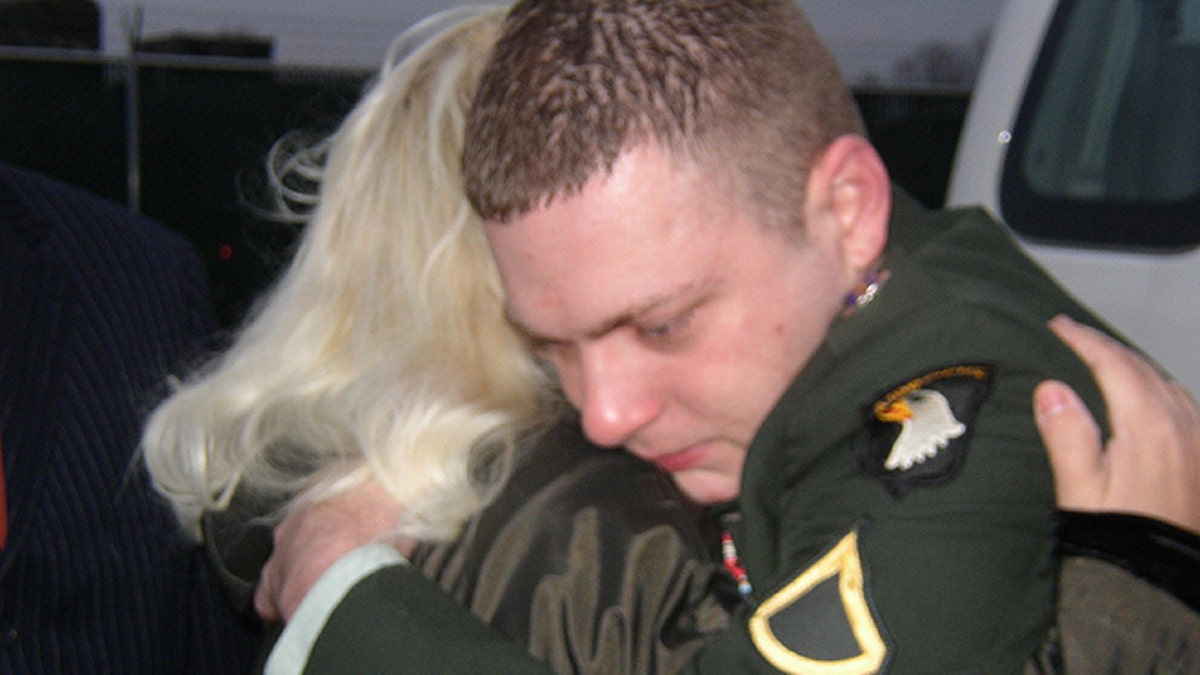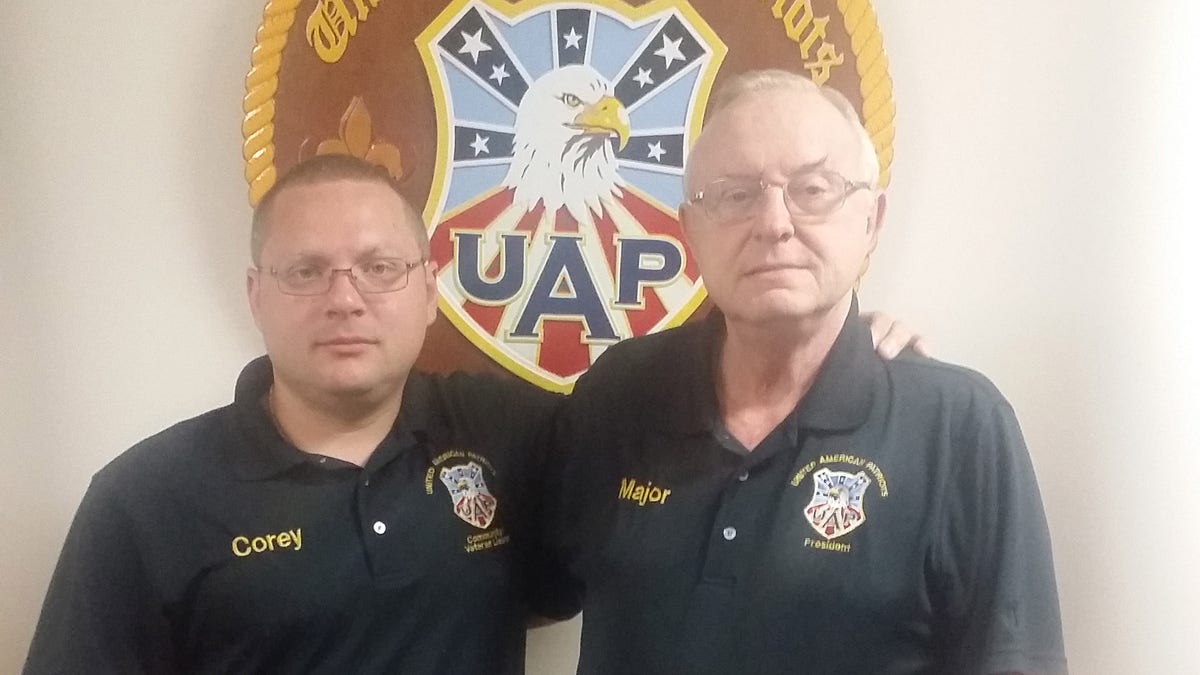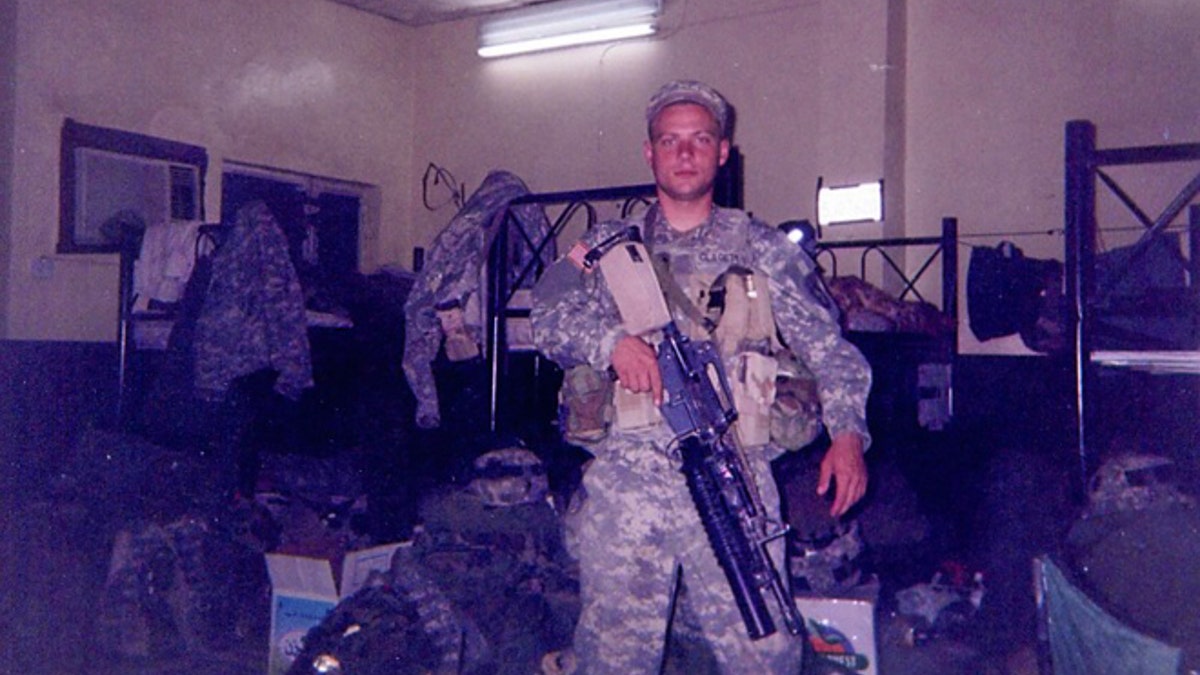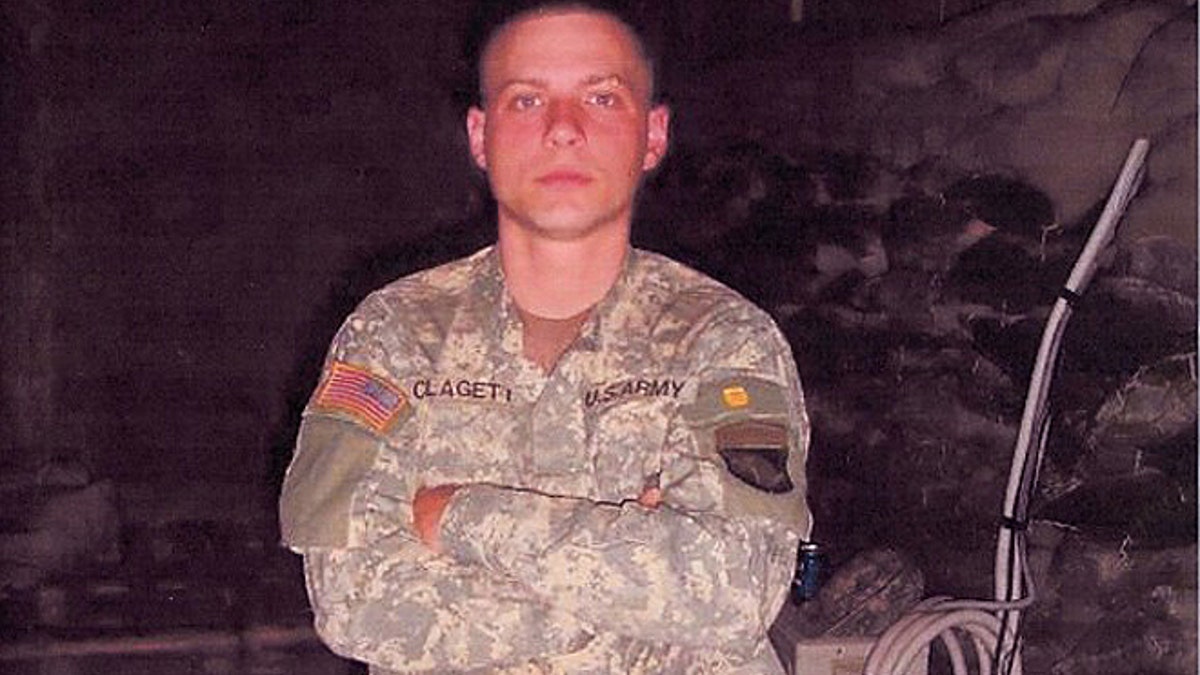
Corey Clagett, seen here hugging his mother before leaving to begin his prison sentence in 2007, was recently released and is petitioning for a pardon so he can re-enlist. (Sheryl Levine Guterman)
Corey Clagett was a 21-year-old U.S. Army private in the 101st Airborne Division on a mission deep inside Al Qaeda-controlled territory in Iraq when, he says, he followed an order that would change his life forever.
It was May 9, 2006, and Clagett’s squad had been dropped on to a tiny lake island 200 miles north of Baghdad. They were told it was a terrorist training camp, and members would later testify the rules of engagement were to kill all military-aged males in the area. When they caught three men hiding in a house, the squad’s leader ordered Clagett and three others to let them go – and shoot them as they fled.

Clagett, (l.), and Donohue, (r.), are working to help other US servicemembers they believe got unfair treatment in the military justice system. (Courtesy: United American Patriots)
“I was just a private. I looked up to the higher officers. We thought they were following the rules,” Clagett, who was released earlier this year after serving 10 years at the U.S. Penitentiary in Leavenworth, Kan., told FoxNews.com. “I followed their orders and thought it was the right call, but it wasn’t the case.”
Shooting unarmed men in the back as they fled violated the most basic rules of war, and following orders is no defense if the orders were unlawful. Clagett pleaded guilty to murder, attempted murder, conspiracy and obstruction of justice.
“It was hell. The minutes seemed like days and the hours felt like months.”
Yet supporters of Clagett and others in the “Leavenworth 10,” the name given to a fluctuating group of men imprisoned at Leavenworth for actions in Iraq and Afghanistan say the men were scapegoats for their superiors, sacrificed to appease the governments in Iraq and Afghanistan.
Their cases have garnered online petitions and brought together odd coalitions of military veterans and young legal students who believe justice is not always served when young service members’ fates are sealed in military courtrooms far removed from the heat of battle.
Among the more well-known cases is that of Army First Lt. Clint Lorance, who is serving a 20-year sentence for ordering his men to shoot two suspected Taliban scouts in July 2012 in the Kandahar Province of Afghanistan. Lorance had just taken command of the platoon after the prior leader and several others were killed days before by fighters using information provided by scouts.

Supporters of Clagett and nine other soldiers comprising the “Leavenworth 10” say the men were scapegoats for their superiors, sacrificed to appease the governments in Iraq and Afghanistan.
Another is U.S. Army Master Sgt. John Hatley -- a highly decorated, 20-year vet who served in Operation Desert Storm and did another three tours during the Iraq War -- now serving a life sentence at Leavenworth. His conviction stems from an April 2007 incident in Iraq in which he and his unit captured four enemies following a firefight. He was ordered to let them go, and maintains he did, but military prosecutors say Hatley and his men killed the suspects. No bodies were ever found.
In Clagett’s case, the staff sergeant he claims ordered him to shoot the Iraqis had his own criminal charges dismissed on an appeal. Raymond Girouard was eventually given back pay and an honorable discharge.
Clagett, who grew up in Moncks Corner, S.C., and enlisted right out of high school, was paroled on March 31 after a grueling stint that included years of solitary confinement for mounting infractions such as receiving too much mail and having contraband items in his cell.
“It was hell,” he told FoxNews.com. “The minutes seemed like days and the hours felt like months.”
His case and subsequent treatment drew the attention of the University of Chicago Law School’s Combat Clemency Project, which is petitioning the Army for a full pardon of his conviction.
"Corey committed a crime for which he has expressed remorse and been punished severely -- much more severely than anyone else involved in the incident,” said Eamonn Hart, a law student who worked on Clagett’s petition. “That includes his direct superior, who ordered Corey, an impressionable young private first class, to do what he did.”

Clagett believes he was a positive force while serving in Iraq.
The legal group stressed that a pardon would not condone the shooting, but could help Clagett rebuild his life.
“A pardon isn't a statement that what Corey did was right, but rather, an exercise of mercy, merited by the fact that he has been punished so much more harshly than anyone else involved," Hart said.
For now, Clagett has found work with United American Patriots, a North Carolina nonprofit that helps service members who face injustice. The group helped Clagett win an early release from an 18-year sentence after learning the details of his case.
“I got to know him well, the more I spoke with him,” said United American Patriots founder Herbert Donahue, 72, a retired major who served in the U.S. Marines in Vietnam. “The more I realized that this was not the type of person to be rotting away in jail.”
Clagett is working in Kernersville, N.C., as a United American Patriots community and veterans liaison.
“This job means everything to me,” Clagett says. “The only job opportunities were for $6 an hour and living back at home.”
It’s a sense of purpose Clagett hasn’t felt since he served in Iraq, where he insists he had a positive impact.
“I feel there’s more to do,” Clagett told FoxNews.com, adding that he wishes he could re-enlist. “I was doing good. I remember one incident where we saw this family living on the side of the road in a tent. They had nothing. They were starving. We gave them all our food and all of our water. To see the happiness on their faces, it changed me.”

